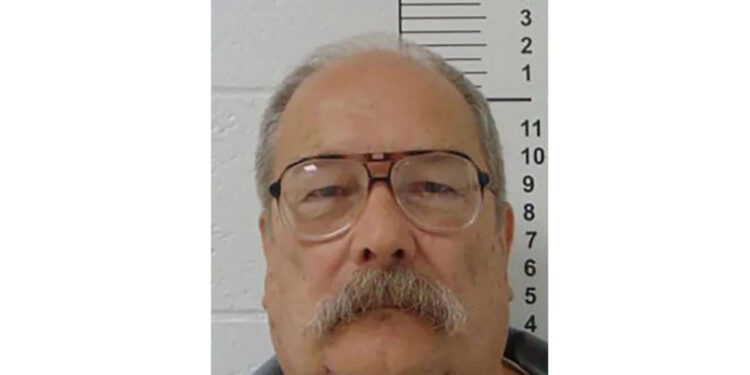A Missouri inmate scheduled for execution next month has been hospitalized due to a “medical emergency,” according to a spokeswoman for the Missouri Department of Corrections.
David Hosier, 69, is expected to be executed on June 11 for the 2009 murders of Angela and Rodney Gilpin of Jefferson City. Hosier’s attorney, Jeremy Weis, stated that a jail doctor diagnosed him with heart failure this week. Barbara Morrill, Hosier’s sister, claims he has atrial fibrillation, which produces an erratic heartbeat.
Morrill stated that her brother became ill approximately a week ago and has worsened, with leg edema and considerable discomfort. She wondered why it had taken so long to get him out of his cage.
“He’s in a lot of pain,” she explained. “He cannot walk. “He can barely speak.”
Karen Pojmann, a spokeswoman for the Missouri Department of Corrections, stated that she was unable to give additional information due to privacy concerns.
The Rev. Jeff Hood, Hosier’s spiritual adviser, stated at a news conference on Friday that Missouri is considering executing a very ill man.
Hood informed his family that he suffers from acute heart failure. “The question arises: What level of illness is necessary for a person to avoid execution in Missouri?”
It wasn’t immediately clear whether the state would postpone the execution. Hosier has always maintained his innocence, but the police and prosecutors claim the evidence against him is overwhelming.
Hosier is the son of a police officer who died in the line of duty. In 1971, when David Hosier was 16, a murder suspect shot and killed Indiana State Police Sergeant Glen Hosier. Other officers killed the shooter.
On the night of his father’s shooting, David Hosier awoke to find a trooper beside his bedside. “I heard mom downstairs crying, and when that happens, you know what it usually means,” he said in an interview with The Associated Press last week before falling ill.
Hosier attended military school and eventually joined the Navy, where he served four years of active service. In the late 1970s, he was visiting his sister in Missouri when he met the lady who would become his first wife. They eventually moved to Jefferson City. He spent several years working as an EMT and firefighter.
Hosier admitted to having an extramarital affair with Angela Gilpin in 2009. She ended things and reconciled with her husband. Soon after, in September 2009, a gunman opened fire near their apartment door.
Hosier claimed he didn’t do it.
“How can you find a person guilty beyond a reasonable doubt and sentence that person to die when you have no witnesses to a crime, no fingerprints to tie this person to a crime, and no DNA to tie this person to a crime?” Hosier asked.
According to court documents and investigators, there is strong circumstantial evidence.
“He (Hosier) was romantically involved with the victim,” said Randy Dampf, a Jefferson City police officer at the time of the crimes who is now an investigator for the county prosecutor. “She had wanted to break off the relationship, and he was angry about that.”
According to Detective Jason Miles, Hosier made multiple threats to Angela Gilpin in the days leading up to the murders. Police discovered a protection order application in Angela Gilpin’s purse, as well as another document in which she expressed concern that Hosier might shoot her and her husband.
“I am totally convinced of his involvement in this case, and I think all of the evidence supports that,” Miles stated.
Hosier was an immediate suspect, but authorities were unable to locate him. They utilized mobile data to follow Hosier to Oklahoma. An Oklahoma cop attempted to stop Hosier’s car, resulting in a chase. When he got out, he told the officers, “Shoot me and get it over with,” according to court records.
Officers discovered 15 guns, a bulletproof vest, 400 rounds of ammo, and additional weapons in Hosier’s automobile. Detectives determined that a kit-made submachine gun was among the weapons used in the crimes.
Hosier found a message in the front seat of his car. “If you are going with someone, do not lie to them,” it stated in part. “If something is wrong, be open with them.” “If you don’t, this might happen to you!”
Hosier claimed he wasn’t escaping to Oklahoma but rather taking a lengthy journey to clear his head. He owns a lot of guns because he enjoys hunting, he explained. He didn’t recall leaving a message in the car.
The Missouri Supreme Court affirmed the conviction in 2019.
Hood said that the law enforcement community is known for its support of the families of fallen officers. He added, “They should do the same for Hosier.”
“The difficulties of David’s life are a product of having to experience the death of his father in the line of duty,” Hood stated. “How can they say, ‘Leave no family member of the fallen behind,’ and cheer on the execution of David Hosier?”










